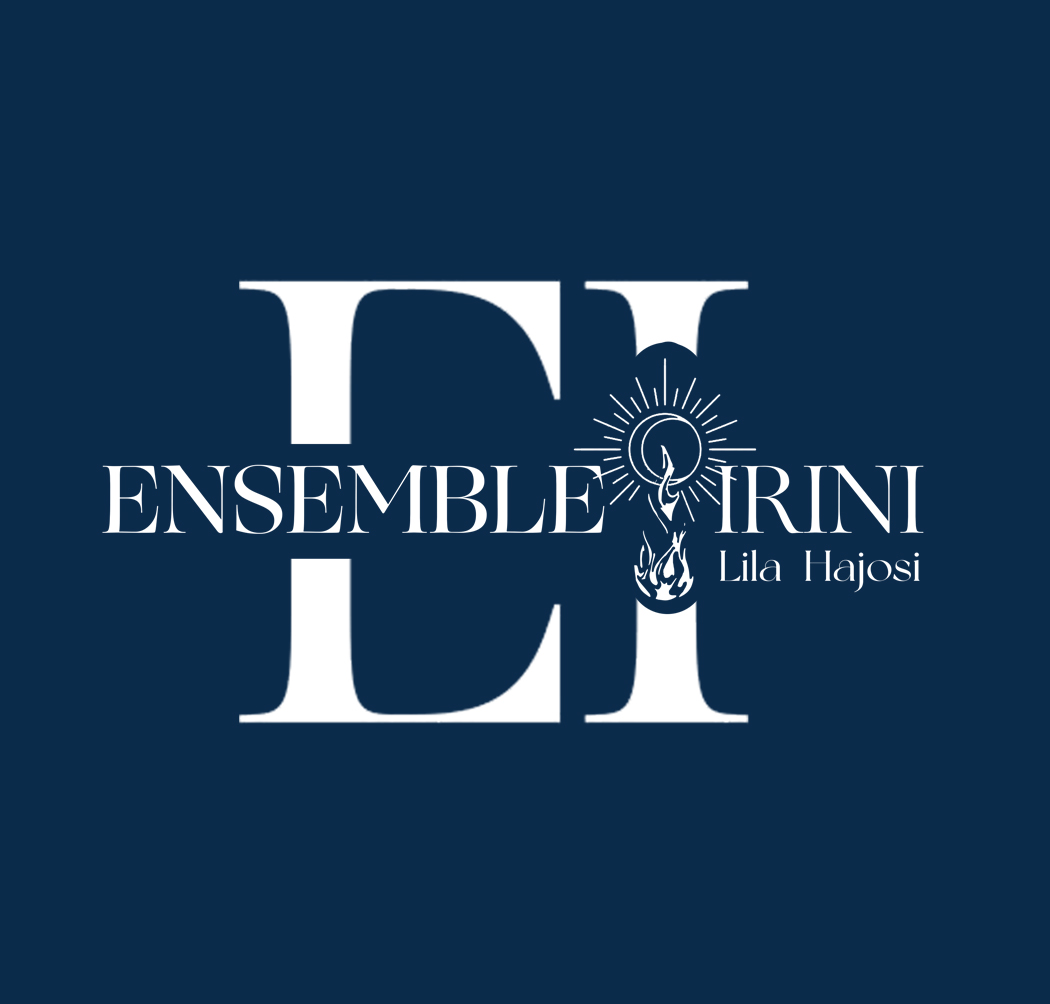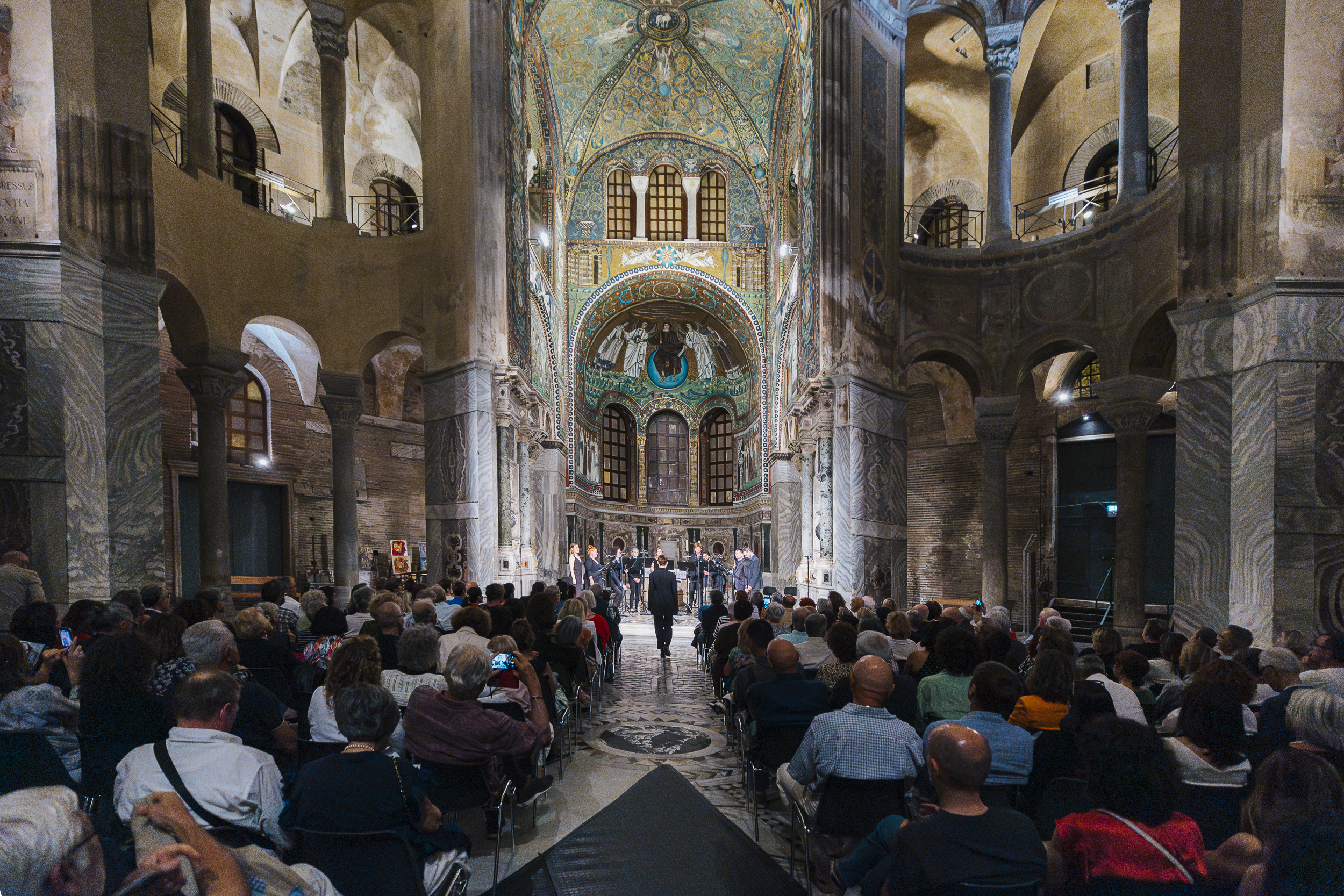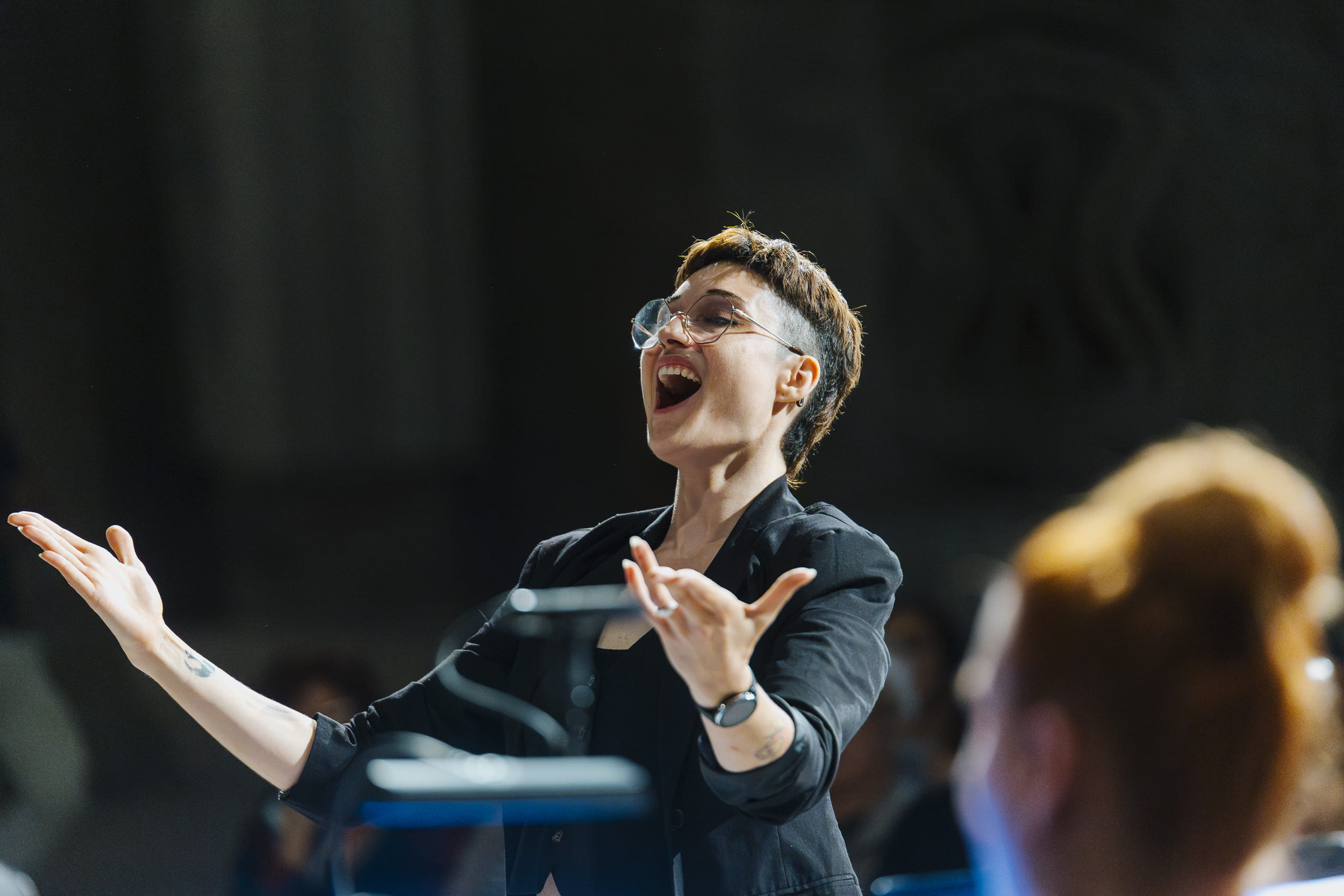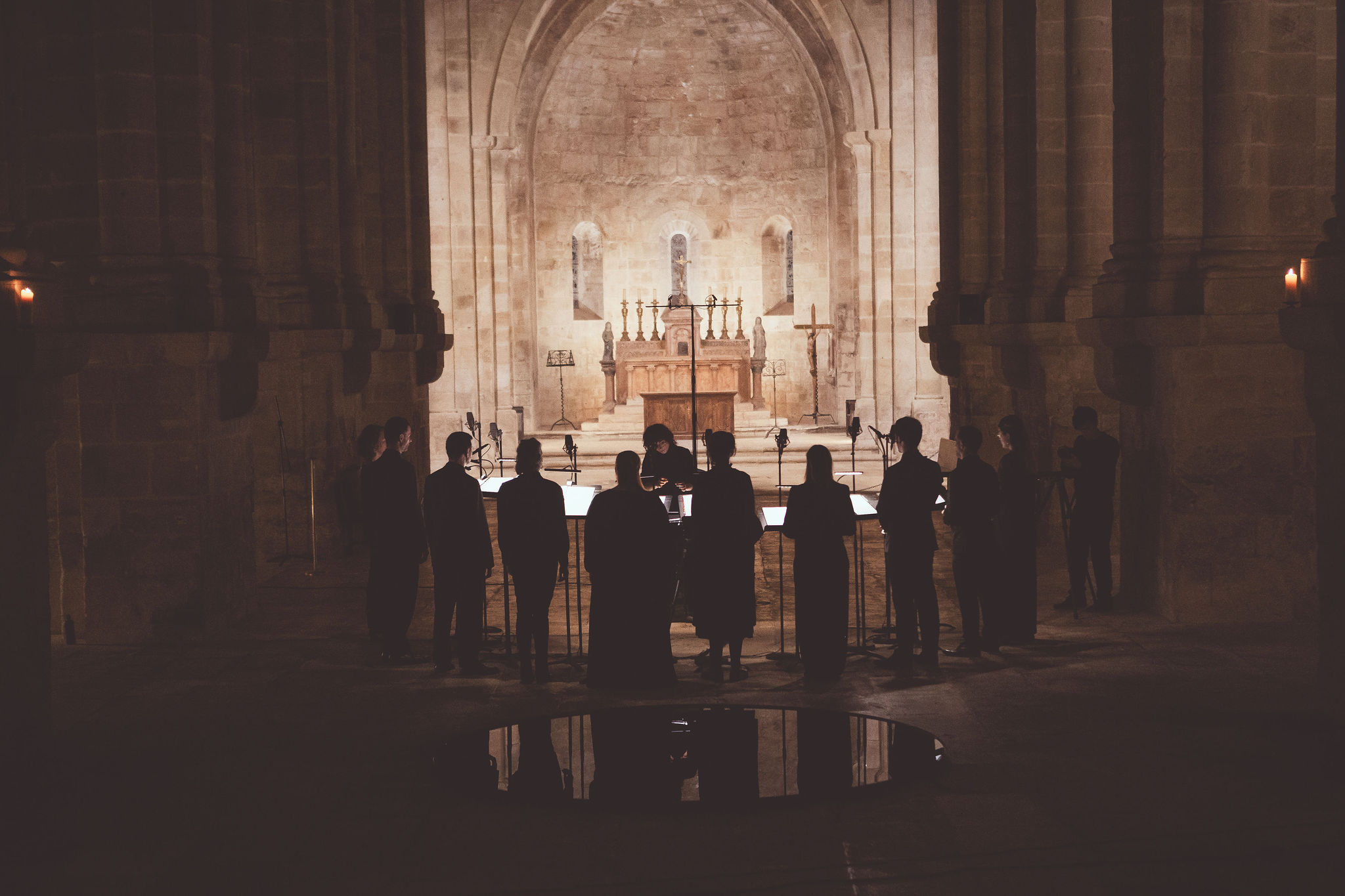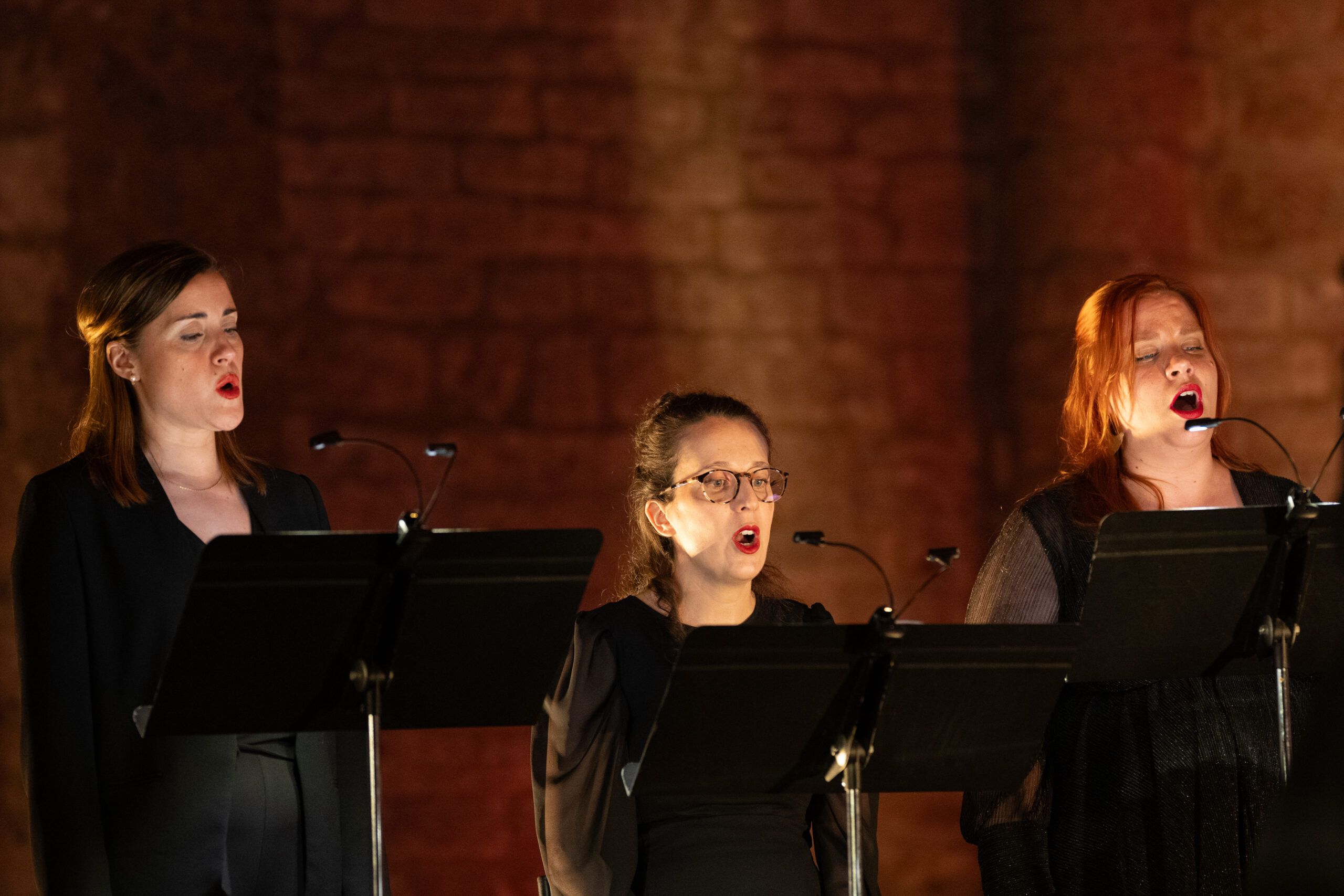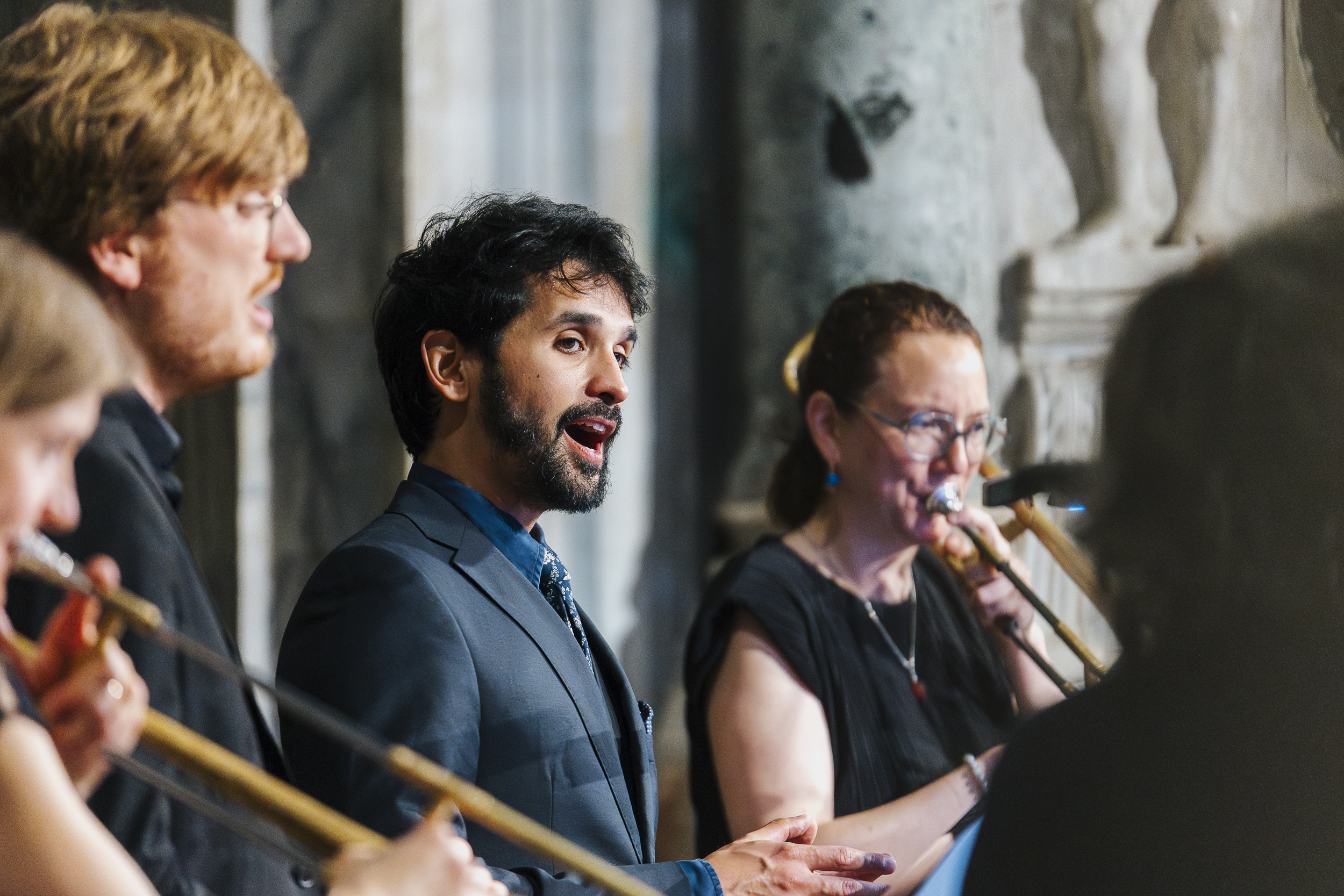Béatrice Verry, Paroles protestantes, May 2025
"The superb sound color of Ensemble Irini, warm and velvety, and the musical and spiritual commitment of Lila Hajosi and her singers, overwhelm us in this three-stage journey..."
E.R., 440 clàssica, February 2025
"The voices weave movingly pure polyphonic interplays in a mysterious and captivating work."
France Musique, R.Bruneau-Boulmier/E.Munera, En Pistes!, December 2024
"It's a chorus coup that's both for the repertoire and for the musicians."
"Music that we don't know very well and that is absolutely fascinating."
"En los últimos años, hemos escuchado a menudo, a veces más de lo que nos gustaría, eso de que es bueno salir de la zona de confort.
Desde luego, se trata de una apuesta atrevida, que se aleja de los cánones habituales en los proyectos discográficos en el mundo de la música antigua. "
Camille de Rijck, La Libre, November 2024 / ****
"Exciting and beautifully executed. "
Nicolas Le Clerre, First Lodge, November 2024
"Lila Hajosi knows how to maintain high musicological ambitions from disc to disc, and this new recording sets the bar very high in terms of demanding repertoire and editorial quality."
"Placing Ensemble Irini's new disc on the turntable and listening to it in the continuity of its thirteen tracks is akin to a form of invigorating spiritual retreat. "
"Stripped of all instrumental accompaniment, Lila Hajosi's work consists of tuning the timbres of her nine singers into polyphonies of varying dimensions, all of which speak to the heart as much as to the mind. These deep, gravelly voices emanate a serenity and a kind of wisdom whose sincerity is deeply moving.
Sophie Bourdais, Télérama, November 2024 - TTTT
"(...) the timbres are superb, well-characterized and yet fused. A quest for depth and purity guides the work on sound, which borders on the sublime in the Virgo Prudentissima motet, with its polychrome, transformist stained-glass window allure."
Hilaire Vallier, Famille Chrétienne, November 2024
"The rendering is striking: for some pieces, language notwithstanding, you no longer know who's who. Two lungs, but one faith."
Gérard Pangon, Musikzen, November 2024
"From the outset, a motet by Heinrich Isaac defines the quest for purity and the sacred, and sets the tone for this demanding but exciting album, where we discover the beauties of Georgian liturgical chants, performed with a rigor that tends towards perfection."
Pierre Lamy, Quobuz - October 2024
"(...) at the beginning of the month, the remarkable vocal ensemble Irini (...) delivered Printemps sacré, an audacious program (...) a rarity not to be missed under any circumstances".
Yvan Beuvard - Forumopera- october 2024
"All their interpretations, a cappella, stand out for their quality of emission, freshness, suppleness and rigor. "
"(...) the ensemble sings, round and fleshy, with rare suppleness and remarkable line control. "
"(...) the discovery of these distant polyphonies (...) is well worth listening to. "
Lara Othman Classikeo - October 2024
The disc begins with a motet by Isaac and then moves on to Georgian songs. The richness and profusion of vocal colors first strike the listener, as dark, low voices are superimposed one on top of the other, enhanced by the brightness of the mezzos' clear voices. But what strikes the listener most, as the listening progresses, is the rigor and precision with which the interpretation is carried out - a work of drawing, of tracing the outline of the music by the voices, as with a geometrical figure. Special mention should be made of the small incursion into Greek liturgy with Christos Anesti, where the clarity of the voices seems to sculpt the music. A success, for Ensemble Irini, in this work of both research and vocal rendition.
Why we love it:
For the quality of polyphonic interpretation
For the effort to restore Georgian music
For the historical research work carried out by the entire
Volker Timmermann, NWZ ONLINE - August 2024
"After the orchestral sound acclaimed by the public, the great contrast: in St. Johann im Schnoor, the Irini ensemble, led by conductor Lila Hajosi, sings. This [...] top-quality ensemble takes us back to the meditative, intimate sound world of the Renaissance. For example, with the early polyphony of the great Franco-Flemish master Guillaume Dufay, who once officiated at the papal chapel. Alongside him, Byzantine liturgical music from the 14th and 15th centuries, with its distinctive melody, rarely heard here, unfolds a strange magic for our ears."
Andreas Schnell - KREISZEITUNG - August 2024
"Our "Great Night of Music" ends in St. Johann im Schnoor with an almost transcendental musical experience. The Ensemble Irini, from Marseille in France, has specialized in early sacred music since its foundation almost ten years ago, virtually sailing between East and West. Ensemble Irini at the music festival: from Marseille to Constantinople: the program included works by Guillaume Dufay, Janus Plousiadenos and Manuel Doukas Chrysaphes. Dufay worked in Rome in the late 15th century, while Plousiadenos and Chrysaphes were active around the same time in Constantinople. They played under the direction of Lila Hajosi, whose conducting hinted at the complexity of this music, which may seem mysterious to the untrained ear. However, it is imbued with a charm that is easily revealed: at times, broad arcs unfurled above held notes, at other times the four singers and two trombonists wove their voices into fragile interweavings - and the trombonists also once had their moment of glory without vocal accompaniment. Only a fireworks display, clearly not on the program, briefly interrupted the mood of this wonderful concert, which transported its audience back to a bygone era, when the separation of the Church between East and West had to be overcome."
Nicolas Le Clerre - Première Loge Opera - August 2024
"[...]The same atmosphere of inter-religious dialogue that characterized the first half of the 15th century is the backdrop to the demanding program concocted by Ensemble Irini for the third day of the Rencontres musicales de Vézelay. Skillfully crafted by Lila Hajosi, the concert is organized into three phases: Union - Council - Fall, and musically illustrates the attempt to bring the Churches of Rome and Constantinople closer together at the Council of Florence in 1439. [...] Ten protagonists - eight singers and two trumpeters - are all it takes to recreate this atmosphere on the fringes of medieval Europe in the charming setting of the Vault-de-Lugny church. To the audience's thunderous applause, Lila Hajosi's silhouette, a tattooed conductor with a boyish hairdo, suddenly takes on an air of extreme fragility, and the few words she timidly utters to remind us of the close links between Ensemble Irini and the Cité de la voix are tinged with genuine sincerity. We are grateful to her for having opened the door to the iconostasis of Orthodox churches, and for having made the mystery of Eastern Christian liturgy accessible to the Rencontres musicales audience".
Emmanuelle Giuliani - La Croix - August 2024
"The Ensemble Irini [...] has proposed a spellbinding journey through time and the history of the Christian Churches. [...] The concert, built with intelligence and sensitivity around the polyphonic gems composed by Dufay, invites our contemporary ear to sail from West to East. The sound balance is based on the vocal personalities of the singers, the subtle blend of profound humanity of timbre, simplicity of expression and perfect musical flexibility. Everything sounds just right, noble and intense. Sandie Griot and Claire McIntyre support the voices in Dufay's pieces (all of which are confoundingly beautiful), and punctuate the proceedings with a few purely instrumental interventions, adding the golden hues of early brass to the ambient magic. With gentleness and fervor, elegance and sobriety. [...] "
Lara Othman- Olyrix - August 2024
"In the former church of Saint-Germain-d'Auxerre in Vault-de-Lugny, these ensembles of medieval polyphonies resonate, revived with light by Ensemble Irini. The balance is immediately noticeable, as is the dynamism with which the voices respond to each other, tuning and linking up (...) The entry into the Orthodox repertoire immediately contrasts with Dufay's pieces, with the more imposing presence of the basses, but the care given to precision is identical, if not better. Last but not least, the instrumentalists are not to be outdone, particularly highlighted in a medieval trumpet duet full of density and dazzling colors".
Maryvonne Colombani, Zébuline, October 2022- Sacred Spring - Musicatreize
"The voices, placed with precision, are pure and soaring. At times a slight natural vibrato adds to their meaning. "The choir gathers on most of the pieces the whole ensemble, mezzo-sopranos, Eulàlia Fantova Alvarez, Clémence Faber, contraltos, Julie Azoulay, Lauriane Le Prev, tenors, Olivier Merlin, Matthieu Chapuis, basses, Guglielmo Buonsanti, Sebastien Brohier, but sometimes it is satisfied with the presence of four or six voices. The originality of this choir lies in the union of male and female voices, which some purists insist on separating when it comes to early music. [...] This necessary step leads [...] to Heinrich Isaac's dazzling Virgo Prudentissima, a true masterpiece with constantly renewed, alternating, woven, intertwined threads, taken up again in a supple circulation between the different desks. An impression of plenitude emanates from it that transports the audience."The word is music, sumptuous in its incandescence.
Frédéric Norac - Musicologie.org, July 2022 - O Sidera - Abbaye de Noirlac
"In the ideally ventilated acoustics of the monks' refectory, the Irini ("peace" in Greek) ensemble displays all the splendor of 14th century Latin polyphony, with the Chant des Sybilles by Roland de Lassus. We admire the quality of the ensemble, its homogeneity, its tonal hyper-precision in the Latin pieces, but it is especially in the Byzantine part that the magic fully operates "
"We particularly retain this "Cheruvikon" (Hymn of the Cherubim), a long sequence where the voices take turns from the lowest to the highest, against a background of an astonishing faux-bourdon supported by the bass Sébastien Brohier. If the ensemble proves to be particularly balanced, the solo parts offered by the Byzantine pieces allow us to appreciate the flavor of each of the voices that compose it, the two female voices, the suave soprano of Eulalia Fantova and the delicately nuanced contralto of Julie Azoulay, the tenor of a beautiful clarity of Benoît-Joseph Meier and the round and warm bass of Guglielmo Buonsanti, as well as the deeper voice already mentioned. Most of the pieces have been arranged by the conductor of the ensemble, Lila Hajosi, in a spirit that seems to be of perfect authenticity. She conducts with precision and flexibility, using a censer for the last two pieces, from which one could easily imagine the purifying smoke coming out [...] ".Charlotte Saulneron, Resmusica, April 2022
Of the order of the impalpable, the new disc of the Irini O Sidera ensemble blends East and West with a mystical depth that each listener will perceive deep inside. (...)
This interpretation by Eulalià Fantova (mezzo-soprano), Julie Azoulay (contralto), Benoît-Joseph Meier (tenor), Guglielmo Buonsanti and Alessandro Ravasio (basses), seems to be meticulously sculpted, or approached like a learned mathematical model. (...)
With these liturgical arias, time is lengthened for a vibrant spiritual trance that no longer requires words. more
Émilie Munera , Program " En-pistes! France Musique, February 2022
"A very beautiful record"
"Very beautiful journey between East and West carried by the 5 voices of the ensemble"
"Mystical journey totally successful"
Soline Heurtebise, Ôlyrix, February 2022
Refined and powerful, the sound elaboration is rich, carried by the voices of the five soloists of the ensemble.
The high notes of mezzo Eulalia Fantova sound deep, ornamented with austere accuracy and pure line. The clearer voice of contralto Julie Azoulay is particularly resonant in the Byzantine repertoire. Alessandro Ravasio impresses with an abysmal bass voice, complex, flexible and very operatic. Guglielmo Buonsanti, on the other hand, has the austere, calm and composed prosody of the low orthodox. More baroque, the tenor Benoît-Joseph Meier offers himself with a lively, supple and precise voice.
The prosody typical of Madrigalist music is thus offered with powerful accents, under the direction of the musicologist and young conductor Lila Hajosi. The music rises up and suspends time with these airy voices, between wisdom and the power of seizure, quite a journey. More details
Christine Ducq, La Revue du spectacle, December 2021
The Irini ensemble combines dramatic efficiency and expressive depth, serving this contrapuntal writing with subtlety and heart.
(...) the ensemble takes us out of our noisy and dark world for a luminous journey beyond the known borders, and invites us to a "contemplation of its share of infinity".
After the sibyls, Irini's singers become six-winged cherubs. It is always a question of raising our eyes to the heavens to question the mystery of the universe. Let us note the high view of the introductory text of her beautiful project by Lila Hajosi in the CD booklet, entitled A song without entertainment, which calls for a demanding and, let us say, philosophical listening - for a moment marked by spirituality.
Gérard Pangon, Musikzen, December 2021
(...) These Prophecies are a dive into mystery. Interpreting these scores full of sharps and flats is therefore a challenge of the kind taken up quietly by Ensemble Irini, which is inclined towards rather mystical and little-known a capella repertoires. What is more, in order to stress the need for spiritual introspection and to try to bring 'Man [...] back into the groove of a symbiotic awareness of his existence' (Lila Hajosi), the programme adds to the music of Roland de Lassus some liturgical pieces from Constantinople, endowed with the same meditative virtues. More details
Bettina Winkler, SWR2, December 2021
A happy mix of aesthetics and a result that is worthy of the efforts made. A Christmas favourite. More details
Thierry Vagne, Classical Music & Co, November 2021
(...) a very beautiful interiority. The disc alternates de Lassus' Prophecies of the Sybil with Byzantine liturgical chants. The pieces by de Lassus are slow, rather low key, despite the presence of a mezzo and a contralto. Some anonymous pieces from Constantinople bring a welcome animation.
A very careful performance by the Irini Ensemble conducted by Lila Hajosi.
Soline Heurtebise, Ôlyrix, November 2021
Celestial music, suspended time and aerial voices, the Irini Ensemble succeeds in dematerialising our modern world towards the musical areas of the European renaissance and Byzantine music (...) Here, more intimate, more minimalist and precise, the Irini Ensemble allows an approach to medieval musical lines with the precision of an architecture supervised by the young conductor. Currently training with Sergio Monterisi, the vocal mastery of the conductor allows the ensemble to be very coherent, both in vocal expression and in musical choices.
Frédérick Casadesus, Mediapart, November 2021
(...) Listening to these artists, seeing them work, how can we not have the feeling that our era, despite its pains, is also marked by a thousand promises? Enjoy your listening and your day!
Stéphane Loison, VieilleCarne, November 2021
O Sidera enchants me with its vocal qualities, and that's good enough. Yes, we are no longer in the Renaissance, of this fear of original sin, and of all this mythology which gave birth to these superb musics. (...) But as for me, poor sinner, I am ready to consume without moderation the Irini Ensemble, as a quality entertainment, and I advise the reader to do the same for his greatest pleasure and without any qualms. Amen!
Jérôme Gillet, Froggydelight.com, October 2021
(...) The interpretation is as inspired, mystical, almost metaphysical as it is mysterious (there is something mysterious about this function of chromaticism). A record that speaks to the ears as well as to the soul...
René Cocq, Luister, October 2021
Vocally, the motets are extremely demanding and in this performance by Ensemble Irini under the direction of Lila Hajosi, they are impressive for the virtuoso swirls of the voices and their fiery harmonies.
Cécile Chéraqui, Classica, February 2019
(...) This first recording of the Irini ensemble is a marvel of softness, intimacy and homogeneity. Indeed, rarely have timbres and tessituras been so well matched, despite the different backgrounds and universes of the singers. The sheer volume of this three-voice ensemble, with its surprisingly low tessitura, makes us listen to the album with delight (...).
